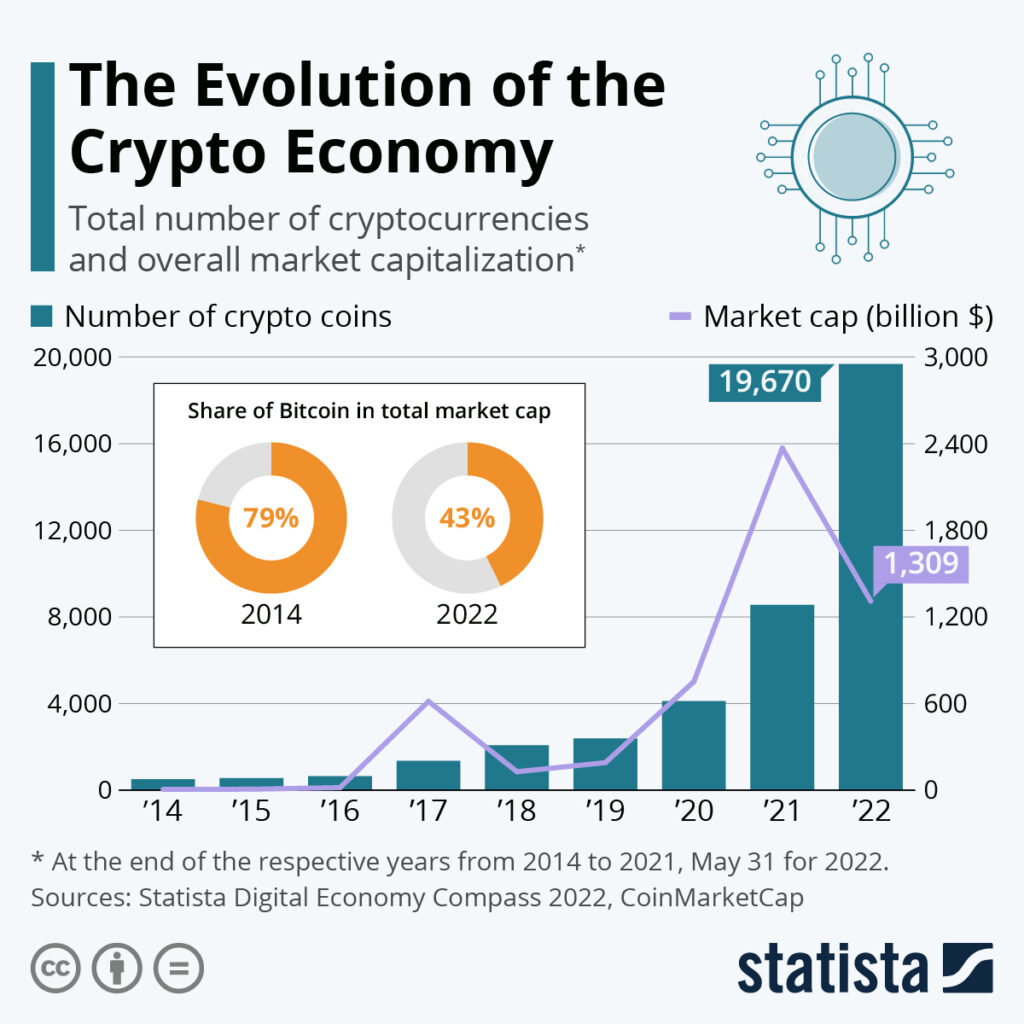Introduction: Cryptocurrency in Future Economy
Cryptocurrency, a digital or virtual form of currency that uses cryptography for security, has surfaced as a disruptive force in the fiscal world. Its impact isn’t only confined to the present but is poised to play a vital part in shaping the unborn frugality. In this composition, we will claw into the colorful angles of cryptocurrency and explore how it’s set to transfigure the profitable geography in the times to come.

Understanding Cryptocurrency
Cryptocurrency operates on a decentralized technology called blockchain, a distributed tally that records all deals across a network of computers. Unlike traditional currencies issued by governments and central banks, cryptocurrencies aren’t controlled by any single reality. Bitcoin, introduced in 2009, was the colonist in this realm, opening the levees for a multitude of indispensable cryptocurrencies, generally appertained to as altcoins.
The Rise of Cryptocurrency: Cryptocurrency in Future Economy
Over the once decade, the relinquishment of cryptocurrencies has steadily increased. Bitcoin’s gradational rise in value, reaching unknown highs, garnered wide attention and burned a global interest in digital means. The appeal of decentralized finance, borderless deals, and implicit investment earnings has attracted a different array of actors, ranging from individual investors to institutional players.
Blockchain Technology The Backbone of Cryptocurrency
Blockchain, the underpinning technology of cryptocurrencies, is a decentralized and tamper- resistant tally. It operates on a agreement medium, icing that all network actors agree on the validity of deals. This translucency and invariability make blockchain an seductive result for colorful diligence beyond finance, including force chain operation, healthcare, and advancing systems.
Smart Contracts and Decentralized operations
Smart contracts, tone- executing contracts with the terms of the agreement directly written into law, are another revolutionary aspect of blockchain technology. These contracts automate and apply the terms of an agreement without the need for interposers. Decentralized operations( DApps) influence blockchain’s decentralized nature to produce innovative results across different sectors, from decentralized finance( DeFi) platforms to gaming and social media.
Cryptocurrency’s Impact on Traditional Banking
The traditional banking sector isn’t vulnerable to the disruptive force of cryptocurrencies. As further individualities and businesses embrace digital means, the need for traditional banking services may dwindle. Cryptocurrencies enable druggies to transfer finances encyclopedically with lower freights and briskly sale times compared to traditional banking systems. This has the implicit to review the part of banks in the global fiscal ecosystem.
fiscal Addition and Cryptocurrency
One of the significant pledges of cryptocurrency is its eventuality to enhance fiscal addition. Traditional banking systems have left a substantial portion of the global population unbanked or underbanked. Cryptocurrencies give an volition, allowing individualities with limited access to traditional banking services to share in the global frugality. Mobile phones, indeed in remote areas, can serve as a gateway to fiscal services through cryptocurrency.

Regulatory Landscape Navigating the query
The nonsupervisory terrain girding cryptocurrency is evolving. Governments and nonsupervisory bodies worldwide are scuffling with the challenge of creating fabrics that balance invention and consumer protection. Some countries embrace cryptocurrencies as a licit form of currency, while others approach them with caution, citing enterprises about plutocrat laundering, fraud, and request manipulation. Striking the right nonsupervisory balance will be pivotal in determining the part of cryptocurrencies in the unborn frugality.
Investment openings in Cryptocurrency
Cryptocurrency has not only captured the attention of individual investors but has also come an seductive asset class for institutional investors. Traditional fiscal institutions, barricade finances, and pots are decreasingly allocating coffers to explore the eventuality of digital means. The growing acceptance of cryptocurrencies as an investment class has the implicit to reshape the investment geography, offering diversification openings beyond traditional asset classes.
Challenges and enterprises
While the future of cryptocurrency looks promising, it isn’t without challenges and enterprises. Price volatility, security pitfalls, and scalability issues are among the hurdles that must be addressed for wide relinquishment. also, the lack of standardization in the cryptocurrency space poses challenges for interoperability and nonsupervisory compliance. prostrating these challenges will be essential for cryptocurrency to realize its full eventuality in the unborn frugality.
The part of Central Bank Digital Currencies( CBDCs)
Central banks are exploring the conception of Central Bank Digital Currencies( CBDCs) as a way to harness the benefits of digital currencies while maintaining control over the financial system. CBDCs, issued and regulated by central banks, could attend with traditional edict currencies and cryptocurrencies, furnishing a ground between the old and the new fiscal systems. The development and perpetration of CBDCs will probably shape the line of the unborn frugality.
Environmental enterprises and Sustainable Practices
The energy consumption associated with cryptocurrency mining, particularly in the case of Proof of Work( PoW) agreement algorithms like Bitcoin, has raised environmental enterprises. The carbon footmark of cryptocurrency mining operations has urged calls for sustainable practices and the disquisition of indispensable agreement mechanisms. The future of cryptocurrency will probably be told by the assiduity’s commitment to espousing environmentally friendly approaches.
Global Collaboration and Standardization: Cryptocurrency in Future Economy
The decentralized nature of cryptocurrencies poses challenges for global collaboration and standardization. Interoperability between different blockchain networks and transnational cooperation in establishing common nonsupervisory fabrics are essential for the flawless integration of cryptocurrencies into the unborn frugality. cooperative sweats by governments, assiduity stakeholders, and transnational associations will play a pivotal part in shaping a cohesive and inclusive global fiscal ecosystem.
The elaboration of Cryptocurrency in Future Economy
As we look ahead, it’s apparent that cryptocurrency will continue to evolve and play a transformative part in the unborn frugality. The ongoing inventions in blockchain technology, the rise of decentralized finance, and the disquisition of central bank digital currencies are reflective of a dynamic and ever- changing geography.
The integration of cryptocurrency into mainstream fiscal systems will depend on how well the assiduity addresses the challenges it faces. From technological advancements to nonsupervisory developments, the future of cryptocurrency is shaped by a myriad of factors that bear careful consideration and strategic planning.
Conclusion : Cryptocurrency in Future Economy
Cryptocurrency’s trip from obscurity to mainstream recognition has been nothing short of remarkable. As we stand at the crossroads of the unborn frugality, cryptocurrency holds the implicit to review how we distribute, invest, and engage with fiscal systems. The keyword” Cryptocurrency in Future Economy” resonates throughout this composition, emphasizing its significance in shaping the profitable geography of hereafter.
The transformative power of cryptocurrency lies not only in its capability to revise traditional fiscal systems but also in its implicit to foster fiscal addition, goad invention, and review the conception of value. The road ahead may be marked by challenges, but the continued collaboration of assiduity actors, controllers, and originators will pave the way for a future where cryptocurrency plays a central part in the global frugality.
